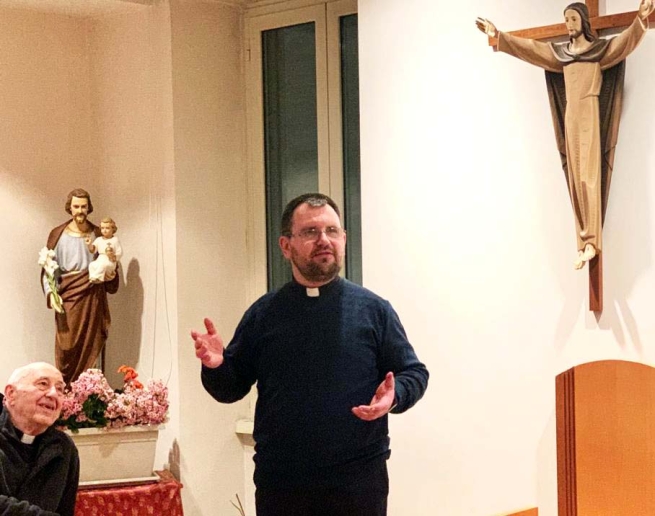"I want to leave a simple testimony: until last December 21, I was the Director of the Salesian house in Kyiv. We lived through the whole siege of the capital. For me it was like reliving the story of Don Bosco," the prelate began in fluent Italian, as he arrived in Italy when he was 17, having finished Ukrainian post-Soviet schooling at the time.
The house in Kyiv, which the Salesians did not build but received as it was, had a unique youth center at the local church level, but it was without a basement. "When the war started we asked the question: where to hide from missiles and bombs?" he continues.
The grounds of the Salesian house adjoin a state school, which, although linked to the Orthodox Patriarchate in Moscow, has always maintained a good neighborly relationship with the Salesians. In the first weeks of the war, it housed 320 people in its basement. "The Director often called me asking that I go and talk to people because there is a generalized depression..."
Bishop Ryabukha recounts how during his visits he tried in every way to encourage, support those in need. Like the time he met an elderly lady with a blank look and asked her if he could hug her, and upon receiving her consent, he felt her "melt" and return to reality in his hands. Or telling them, "I don't know whether you believe or not, but the house you see from your windows is not mine, it is Our Lady's, therefore, nothing will happen in my house. For Don Bosco has promised that every person who crosses the threshold of any Salesian house is under the care of Mary Help of Christians'. But since if something happens to you here, it ends up falling on my house as well, you can rest assured that Our Lady keeps all of you under her custody as well."
Of course, these were words of consolation and support to frightened people. But Msgr. Ryabukha would also like to emphasize another fact: "From the beginning of the full-scale war until today, there is no one among the people who have passed through our house who has died in the war. This for me is a great miracle."
The house in Dnipro is now a center that receives refugees and displaced people from various parts of the country. There is currently only one Salesian left there who has been involved for months in accompanying these people as they flee the war. "The stories he reports are often terrifying, but so far he has managed to save the lives of many people, many boys. This, too, you believe is a blessing that Don Bosco gives us."
On his episcopal appointment as bishop of Donetsk, he says, "Perhaps the Holy Father chose me because he knows that the Salesians are good with the most difficult boys, and there is work there."
And as for his apostolate, he identifies two major areas for the "pastoral ministry of paternity" he intends to pursue: "The parish environment, because the presence of the priest, as well as the bishop, serves to make God's presence manifest and visible. And then also the military: that today is another 'parish' that I have in abundance. Many of those guys are our alumni, the fathers or uncles of our students."
One of these military men - part of the defense contingent protecting the Ukrainian capital and who from the beginning of the war until mid-July attended the Salesian house in Kyiv to shower or change - contacted Bishop Ryabukha again from the front. "He wrote to me, and as soon as he could he even phoned me, to thank me, and he told me, 'I know you are praying for us. I got caught in a bombing raid and shrapnel from a bomb went through my nose. A few inches further and I would no longer be alive today. It was a miracle of Our Lady, which she was always telling us about'."
Msgr. Ryabukha's last words at the end were only of thanks: "I would like to say thank you to all of you, to the Salesian Congregation, which from this heart in the center allows all of us to stay in the field. We are with one another in this mission that Don Bosco dreamed of and wanted to give us and that does not die."


